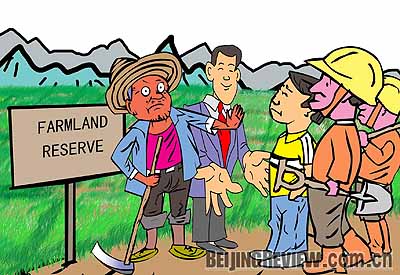|

As a country with a massive population, China has long prioritized its grain self-sufficiency policy, which focuses on keeping the total amount of arable land reserves above the 120-million-hectare bottom line. But a self-funded economist Mao Yushi holds a different opinion. He says that the government's farmland conservation project restrains the process of urbanization in the country.
Mao, who heads the Beijing-based Unirule Institute of Economics, opened fire against the present farmland policy at a seminar on food safety and farmland conservation in Beijing in late 2008, during which Mao said China's food security has no direct link to its farmland reserves. "Over the past three decades, the Chinese population rose 45 percent, while its overall crop output soared 60 percent despite shrinking arable areas," Mao said. He also noted that China is able to feed its people and may solve food problems via imports from world markets.
Mao believes an overprotected land policy has pushed housing prices up to the brink of unaffordability. "It is not building materials or rising labor that drives prices up, but the cost of land, which also hampers the process of urbanization," he said.
Mao's thoughts, controversial as they are, elicited strong criticism among scholars specializing in Chinese agriculture. According to them, China's food security lies heavily on its farmland conservation policy, implemented for years, otherwise food shortages will emerge to threaten Chinese lives. Based on current conditions, new techniques to improve grain yield per unit area are not that effective. Most experts agreed that the bottom line is essential to feed China. Although more than 200 million tons of crops are globally traded each year, China demands at least 500 million tons in total. "If we totally depend on imports, how can we fill the huge food gap?" these scholars ask.
All roads lead to Rome
Chai Sang (www.china.com.cn): In spite of the gigantic population, no food crisis that China has experienced in history was triggered by a shortage of farmland. However, since the implementation of the household responsibility contract system in rural areas, food problems that had plagued this nation for decades have been resolved step by step due to the greatly liberated productivity. Chinese often feel proud of the fact that they support 22 percent of the world's population on only 7 percent of the Earth's arable land. We may have faith in ourselves as long as farm areas are efficiently used and planting techniques are fully developed.
Even if China is able to independently raise itself to ensure food security, it does not have sufficient oil supplies, and therefore has to import oil, meaning an increase in this proportion of trade.
If global trade can help China make up for the oil gap, there could be a chance for China to solve the food issue through imports too.
Tong Dahuan (China Youth Daily): The government's rigid regulation and a baseline for farmland conservation do not necessarily mean that land wastage will stop. However, it is true that a few Chinese farmers are forced to abandon already scarce land resources due to soaring production costs and illegal land confiscation.
On the other hand, the abuse of power intervenes in normal crop-growing activities, crippling farmers' granted rights to the land. As a matter of fact, land policies of such kind are ineffective to guarantee food security, nor useful to shelter farmers. What it does is to create a housing bubble, which will raise the costs for large-scale urbanization.
Wang Pan (Chinese Business View): Mao, who challenged China's longstanding farmland preservation policy, is bold but not completely wrong.
In the early days of economic reform, related central government agencies invited foreign experts to discuss China's agricultural reform. Because of forbidden zones, including collective land systems, fixed household registration (hukou) and non-transferable farmland, those experts could not do much to help. As the process of urbanization accelerates, nowadays collectively owned farmland might be used for property development through legitimate procedures and the household registration system is becoming more flexible, while farmland is allowed to be transferred under authorization. So possibly the farmland conservation threshold will also change in the future.
Staving off starvation
Cao Dongbo (www.cjn.cn): Those who do not take China's food issue seriously have not yet realized the fact that the current farmland reserve is a far cry from adequate. Statistics from the Ministry of Land and Resources show that China's farmland stood at 121 million hectares in 2007, 40,667 hectares or 0.03 percent less than the previous year. Since the founding of the People's Republic of China in 1949, a soaring Chinese population has reclaimed more land, which led to over grazing, soil erosion, or even land desertification so that output capacity has degenerated. Agricultural authorities will have to make huge investment annually in a bid to improve land efficiency, restoring its quality. But toxic fertilizer abuse has already poisoned its ecology, which is harder to be restored. The 120-million-hectare minimum reserve seems not that adequate due to the declining capacity of the land.
| 